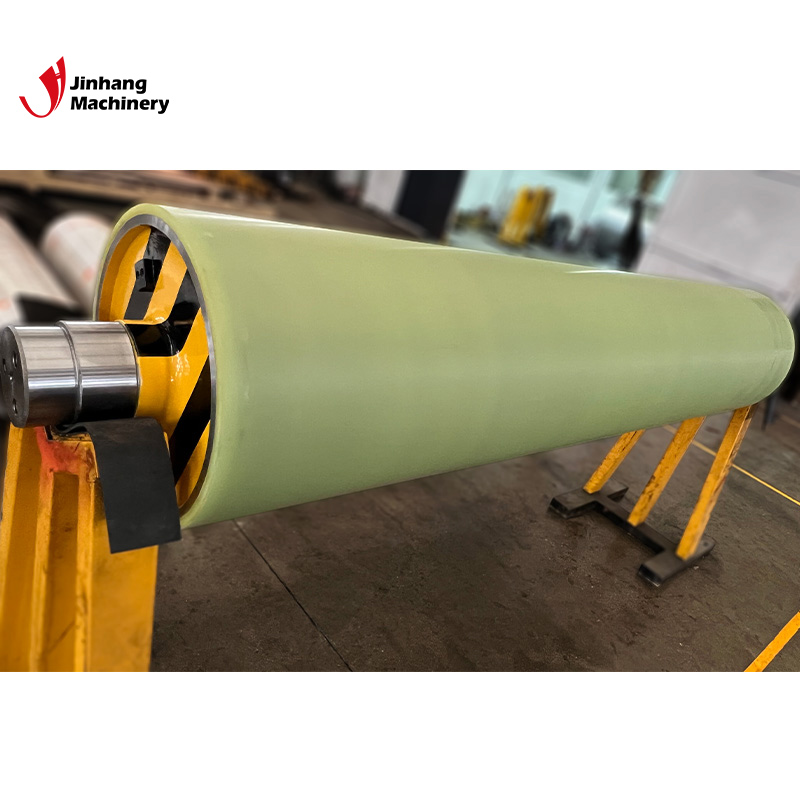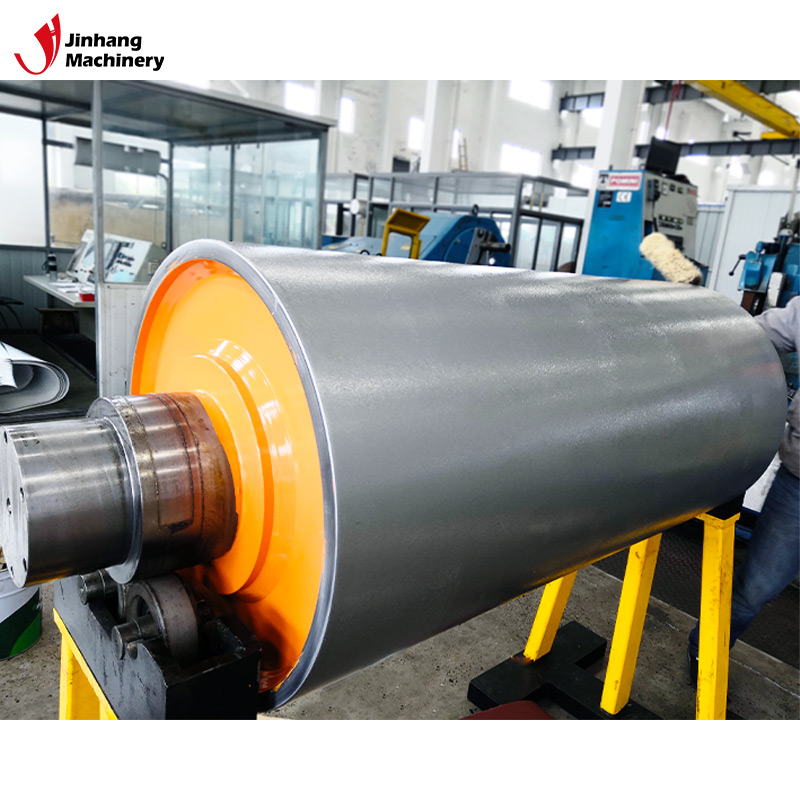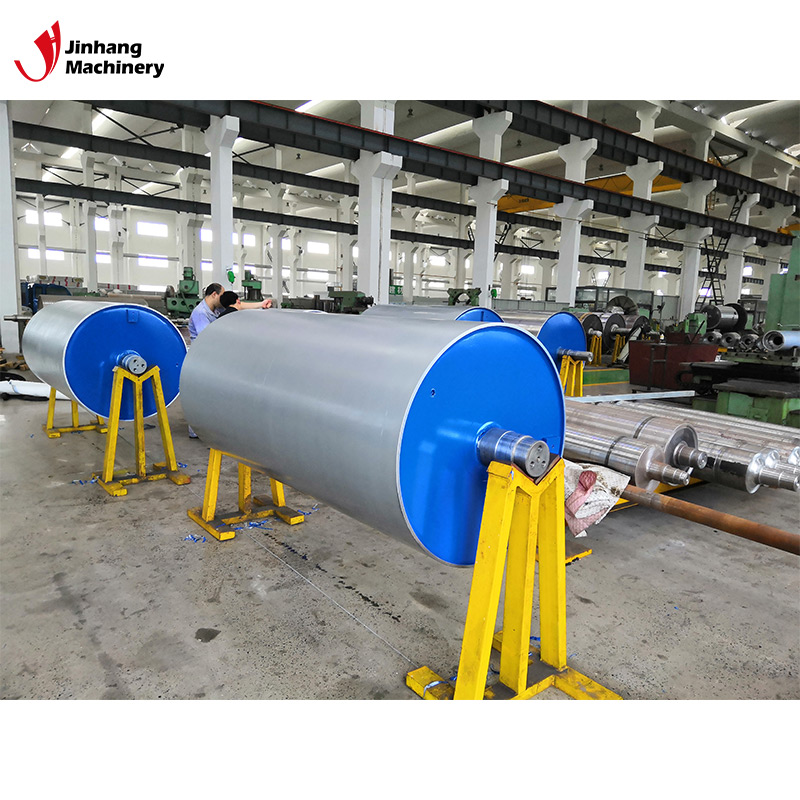Why does the steel industry need to use rubber rollers?
In the steel industry, the production process involves multiple complex and varied processes, and each process has very strict requirements on the equipment. As a key auxiliary equipment, rubber rollers play an important role in multiple links of steel production with their unique performance and role.
This article will discuss in detail why the steel industry needs to use industrial rubber rollers and in which specific links they are needed.

What is a rubber roller?
A rubber roller is a roller covered with a rubber layer. Its inner core is usually made of hard materials such as steel or aluminum, and the outer layer is covered with a layer of rubber material. The main function of a rubber roller is to handle and convey materials through its elasticity and friction.
What are the characteristics of a rubber roller?
1. Elasticity and flexibility: The elasticity and flexibility of rubber materials can effectively absorb shock and vibration, reducing damage to the transmission material.
2. Wear resistance: High-quality rubber has good wear resistance and can maintain long-term performance stability during high-intensity use.
3. Corrosion resistance: Rubber materials have strong resistance to chemicals and moisture and are suitable for various harsh environments.
4. Friction: The high friction of the rubber surface can effectively grasp and transfer materials, ensuring the smooth progress of the production process.

Which link in the steel industry needs to use rubber rollers?
The links in the steel industry that need to use industrial rubber rollers are: raw material processing, hot rolling process, cold rolling process, surface treatment, and finished product transportation.
1. Raw material processing link:
In the initial stage of steel production, raw materials such as iron ore, coal and scrap steel need to undergo a series of processing and transportation. These materials are usually irregular in shape and hard in texture, and the requirements for conveying equipment are very high.
The role of rubber rollers in raw material processing:
The role of rubber rollers in raw material processing mainly includes: conveying raw materials, reducing wear, and absorbing impact.
● Conveying raw materials: Rubber rollers are often used in conveyor belt systems to ensure the stability and continuity of raw materials during transportation through their high friction and elasticity.
● Reduce wear: The elasticity and wear resistance of rubber reduce the wear of equipment during transportation, extend the service life of equipment, and reduce maintenance costs.
● Absorb shock: Rubber rollers can absorb the shock and vibration generated by raw materials during transportation, reducing damage to equipment and materials.
2. Hot rolling process:
Hot rolling is one of the key links in steel production, which transforms steel billets into steel products through heating and rolling. During the hot rolling process, the temperature of steel is extremely high, and the heat resistance and stability of the transmission and processing equipment are extremely high.
The role of rubber rollers in hot rolling process:
The role of rubber rollers in hot rolling process mainly includes: support and guidance, prevention of sliding and deviation, and reduction of surface damage.
● Support and guidance: Rubber rollers are used to support and guide high-temperature steel, and ensure the smooth transmission of steel during rolling through their high-temperature stability and elasticity.
● Prevent sliding and deviation: The high friction of the rubber surface prevents steel from sliding and deflecting during transmission, improving the accuracy and safety of the production process.
● Reduce surface damage: The flexibility of rubber reduces direct contact with the high-temperature steel surface, reducing the possibility of surface damage and defects.
3. Cold rolling process:
Cold rolling is to further roll the hot-rolled steel at room temperature to improve the strength and surface quality of the steel. The cold rolling process also has strict requirements on the transmission equipment, especially in terms of surface treatment and precision control.
The role of rubber rollers in the cold rolling process:
The role of rubber rollers in the cold rolling process mainly includes: precision transmission, protection of surface quality, vibration reduction and noise reduction.
● Precision transmission: Industrial rubber rollers ensure smooth and precise transmission of steel during the cold rolling process, improving the accuracy and consistency of rolling.
● Protect surface quality: The flexibility and elasticity of rubber materials reduce friction and scratches on the steel surface, ensuring the smoothness and quality of the steel surface.
● Vibration reduction and noise reduction: Rubber rollers can effectively absorb the vibration and noise generated during the cold rolling process, improving the comfort and safety of the working environment.
4. Surface treatment:
Steel usually needs to undergo various surface treatments during the production process, such as pickling, electroplating and coating, to improve its corrosion resistance and aesthetics. Surface treatment has very high requirements for the chemical resistance and stability of the transmission equipment.
The role of rubber rollers in surface treatment:
The role of rubber rollers in surface treatment mainly includes: chemical corrosion resistance, stable transmission, and reduced pollution.
● Chemical corrosion resistance: Rubber materials have strong corrosion resistance to acids, alkalis and other chemicals, and are suitable for various surface treatment processes.
● Stable transmission: Rubber rollers ensure stable transmission of steel during surface treatment and improve treatment effects and efficiency.
● Reduce pollution: The low adsorption of the rubber roller surface reduces the pollution of the treatment liquid and ensures the cleanliness and environmental protection of the treatment process.

5. Finished product transportation:
The transportation of finished steel is the last link in steel production, and it is crucial to ensure the integrity and safety of finished steel. Finished product transportation has high requirements for the stability and durability of the equipment.
The role of rubber rollers in finished product transportation:
The role of rubber rollers in finished product transportation mainly includes: ensuring integrity, smooth transportation, and reducing noise and vibration.
● Ensure integrity: Rubber rollers reduce direct contact with finished steel through their flexibility and elasticity, ensuring the integrity and surface quality of finished steel.
● Smooth transportation: Industrial rubber rollers ensure smooth transmission of finished steel during transportation, improving transportation efficiency and safety.
● Reduce noise and vibration: Rubber rollers can effectively absorb vibration and noise generated during transportation, improving the comfort and safety of the working environment.
